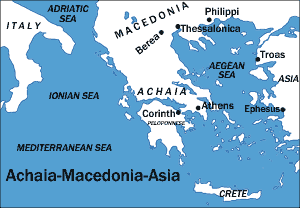
|
Old Testament
New Testament
Gospels
Acts
Paul's Letters
General Letters
Revelation
Topical Studies
Beginning the Journey (for new Christians). en Español

|
Old Testament
New Testament
Gospels
Acts
Paul's Letters
General Letters
Revelation
Topical Studies

|
Home
Bible Studies
Articles
Books
Podcasts
Search
Menu
Donate
About Us
Contact Us
FAQ
Sitemap
 Here
I have tried to outline in order what we can piece together of Paul's contacts
with the Corinthian church.651
Here
I have tried to outline in order what we can piece together of Paul's contacts
with the Corinthian church.651
First Visit (50-52 AD). Paul first visited Corinth about 50 AD, during the last phase of his second missionary journey, after starting churches in Macedonia -- Philippi, Thessalonica, and Berea (Acts 16-17). He came to Corinth after visiting Athens and stayed with a couple of Jewish tentmakers, Aquila and Priscilla, who had recently been forced to leave Rome due to an edict by Emperor Claudius (about 49 AD; Acts 18:2-3). Paul was joined in Corinth by Silas and Timothy. Under their ministry the church grew. Paul seems to have been in danger during this time, because the Lord spoke to him in a night vision:
"Do not be afraid, but speak and do not be silent; for I am with you, and no one will lay a hand on you to harm you, for there are many in this city who are my people" (Acts 18:9-10).
When the Jews appealed to the Roman proconsul Gallio (in office 51 to 52 AD) to force Paul to leave, they were rebuffed (Acts 18:12-17). Paul left Corinth probably in the spring of 52 AD, giving him two years there. After leaving Corinth, Paul stopped at Ephesus and then returned to Antioch. From there he went to Jerusalem (Acts 20:18-22).
"Previous Letter" from Paul is no longer extant. Paul, who is now in Ephesus (52 to 55 AD), wrote to Corinth rebuking vice and fornication by church members (1 Corinthians 5:9-11). This letter is referred to by scholars as Corinthians A.
Report to Paul: Chloe's people reported to Paul about the party spirit and quarrels at Corinth (1 Corinthians 1:11).
Letter to Paul: Stephanas, Fortunatas, and Achaicus probably brought Paul a letter that reports on problems at Corinth, with specific questions about marriage, divorce, food sacrificed to idols, spiritual gifts, and the collection he was organizing for the Jerusalem believers (1 Corinthians 16:17).
Timothy was dispatched to Corinth to deal with some of the problems (1 Corinthians 4:17; 16:10-11).
1 Corinthians Letter: In the Spring of 55 AD, Paul writes during his final year at Ephesus the letter we know as 1 Corinthians concerning problems reported to him. Perhaps this letter was carried to Corinth by Stephanas. This is sometimes called Corinthians B. At this point Paul is planning a soon visit to Macedonia with a stop in Corinth. (1 Corinthians 4:18-21).
Second visit, the "painful visit," is a quick trip to deal with troubles in Corinth that were serious enough to require direct personal confrontation (2 Corinthians 2:1; 13:2). During this visit Paul was personally attacked by one of the members (2 Corinthians 2:5; 7:12). This visit was difficult for both Paul and his converts in Corinth.
"Tearful letter" or "severe letter" from Paul (2 Corinthians 2:3-4), no longer extant, is written from Ephesus, probably carried by Titus in lieu of Paul going himself. In it, Paul apparently professed his love for the Corinthians and required them to discipline the man who had led in defying his apostolic authority on his second visit. This is sometimes referred to as Corinthians C. Apparently, this letter was quite effective in producing repentance (2 Corinthians 7:8-12).
Proposed visits don't come to pass (1 Corinthians 16:1-8) due to intervening circumstances, such as severe danger in Asia and Paul's depression (2 Corinthians 1:8-10), as well as Paul's desire not to make another "painful visit" (2 Corinthians 2:1).
Paul travels to Troas and Macedonia amidst various afflictions, but meets Titus there and is encouraged by his good report about the Corinthian church (2 Corinthians 7:5-7).
"Super-Apostles" challenge Paul's authority, apparently Jewish Christians from Judea, perhaps seeking to impose the authority of the mother church over the Gentile churches. The "superlative apostles" (2 Corinthians 11:5; 12:11) seemed to bring another take on the gospel. Some believe that possibly Paul sent another letter (called Corinthians E, consisting of 2 Corinthians 10-13) to counter these "super-apostles," but this is just speculation.
2 Corinthians Letter: Paul sends our 2 Corinthians letter from Macedonia about 56 AD, sometimes called Corinthians D (at least 2 Corinthians 1-9).
Third Visit to Corinth occurs about 57 AD, when Paul gathers with those who are preparing to send the gift collected to relieve the Jerusalem saints (Acts 19:21-22). Apparently, matters have been resolved to some extent, since from Corinth Paul wrote to the Roman church:
"Macedonia and Achaia have been pleased to share their resources with the poor among the saints at Jerusalem." (Romans 15:26)
 Available as a book in paperback, PDF, and Kindle formats. |
Paul stays in Corinth three months, then escapes to Macedonia to avoid a Jewish plot, meets his companions in Troas (Acts 20:1-5), and leaves for Jerusalem where he is arrested.652
We don't hear anything more about the Corinthian church after this until about 95 AD when Clement of Rome writes 1 Clement to address a new disharmony at Corinth.653
Endnotes
651. This appendix draws heavily on Bruce, 1 and 2 Corinthians, pp. 23-25, 164-166; and F.F. Bruce, Paul: Apostle of the Heart Set Free (Eerdmans, 1977), chapter 24, pp. 264-279.
652. Bruce, Paul, pp. 339-340.
653. For a long time previous to Clement's letter about 95 AD, the church had enjoyed peace and love, but Clement writes concerning a recent rebellion against church leaders that had badly hurt the Corinthians' reputation as a godly and loving church.
Copyright © 2026, Ralph F. Wilson. <pastor![]() joyfulheart.com> All rights reserved. A single copy of this article is free. Do not put this on a website. See legal, copyright, and reprint information.
joyfulheart.com> All rights reserved. A single copy of this article is free. Do not put this on a website. See legal, copyright, and reprint information.

